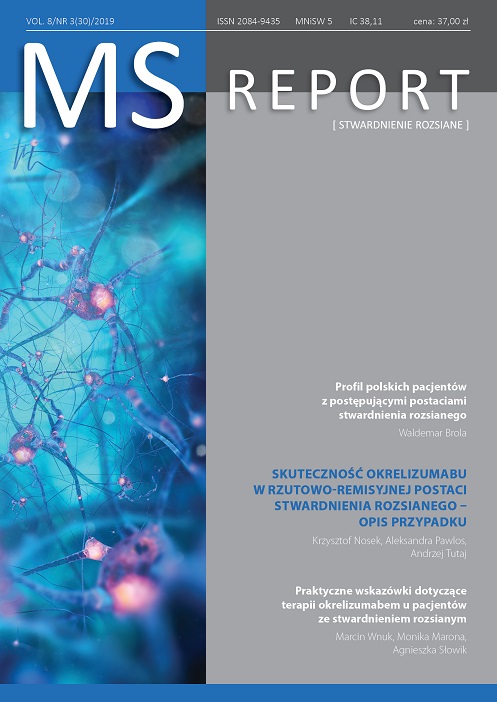Praktyczne wskazówki dotyczące terapii okrelizumabem u pacjentów ze stwardnieniem rozsianym Artykuł przeglądowy
##plugins.themes.bootstrap3.article.main##
Abstrakt
Okrelizumab jest lekiem zarejestrowanym do leczenia dorosłych pacjentów z aktywną postacią rzutową oraz wczesną postacią pierwotnie postępującą stwardnienia rozsianego. W niniejszym artykule prezentowana jest propozycja protokołu leczenia okrelizumabem, który powstał w oparciu o aktualną charakterystykę produktu leczniczego, zalecenia ekspertów niemieckich (Krankheitsbezogenen Kompetenznetz Multiple Sklerose) i doświadczenia własne autorów. Protokół składa się z trzech części. W pierwszej z nich omawiane są zagadnienia analizowane przed leczeniem: wskazania do terapii, przeciwwskazania, planowane badania laboratoryjne i obrazowe, zakończenie szczepień, kwestia ciąży i karmienia piersią oraz zmiana z poprzedniego leku modyfikującego przebieg choroby na okrelizumab. Następnie, w części drugiej, prezentowane są poszczególne etapy związane z podaniem leku – przygotowanie sali wlewów, rozważenie przejściowego odstawienia leków hipotensyjnych, wykluczenie infekcji, premedykacja, wlew okrelizumabu i monitorowanie podczas wlewu. Na koniec, w części trzeciej, poruszane są kwestie monitorowania terapii i inne zagadnienia, takie jak: hipogammaglobulinemia, szczepienia, skrining nowotworowy, nowe objawy kliniczne i/lub radiologiczne podczas leczenia oraz czas trwania terapii.
##plugins.themes.bootstrap3.article.details##
Copyright © by Medical Education. All rights reserved.
Bibliografia
2. Klein C, Lammens A, Schafer W et al. Epitope interactions of monoclonal antibodies targeting CD20 and their relationship to functional properties. MAbs 2013; 5: 22-33.
3. Genain CP, Cannella B, Hauser SL et al. Identification of autoantibodies associated with myelin damage in multiple sclerosis. Nat Med 1999; 5: 170-175.
4. Li R, Rezk A, Miyazaki Y et al. Proinflammatory GM-CSF-producing B cells in multiple sclerosis and B cell depletion therapy. Sci Transl Med 2015; 7: 310ra166.
5. Serafini B, Rosicarelli B, Magliozzi R et al. Detection of ectopic B-cell follicles with germinal centers in the meninges of patients with secondary progressive multiple sclerosis. Brain Pathol 2004; 14: 164-174.
6. Howell OW, Reeves CA, Nicholas R et al. Meningeal inflammation is widespread and linked to cortical pathology in multiple sclerosis. Brain 2011; 134: 2755-2771.
7. Claes N, Fraussen J, Stinissen P et al. B Cells Are Multifunctional Players in Multiple Sclerosis Pathogenesis: Insights from Therapeutic Interventions. Front Immunol 2015; 6: 642.
8. Hauser SL, Bar-Or A, Comi G et al. Ocrelizumab versus Interferon Beta-1a in Relapsing Multiple Sclerosis. N Engl J Med 2017; 376: 221-234.
9. Mulero P, Midaglia L, Montalban X. Ocrelizumab: a new milestone in multiple sclerosis therapy. Ther Adv Neurol Disord 2018; 11: 1756286418773025.
10. Montalban X, Hauser SL, Kappos L et al. Ocrelizumab versus Placebo in Primary Progressive Multiple Sclerosis. N Engl J Med 2017; 376: 209-220.
11. Krankheitsbezogenen Kompetenznetz Multiple Sklerose. Qualitatshandbuch MS / NMOSD. Praktische Aspekte der Therapie mit Ocrelizumab. Stand: Juli 2018.
12. Gingele S, Jacobus TL, Konen FF et al. Ocrelizumab Depletes CD20+ T Cells in Multiple Sclerosis Patients. Cells 2018; 8: E12.
13. Epstein DJ, Dunn J, Deresinski S. Infectious Complications of Multiple Sclerosis Therapies: Implications for Screening, Prophylaxis, and Management. Open Forum Infect Dis 2018; 5: ofy174.
14. Tsutsumi Y, Ogasawara R, Kamihara Y et al. Rituximab administration and reactivation of HBV. Hepat Res Treat 2010; 2010: 182067.
15. Pourcher V, Todesco E, Dubois C et al. False hepatitis B and C viral serologies in patients with multiple sclerosis receiving high-dose biotin. Mult Scler 2018; 1352458518818294.
16. Klotz L, Havla J, Schwab N et al. Risks and risk management in modern multiple sclerosis immunotherapeutic treatment. Ther Adv Neurol Dis 2019; 12: 1756286419836571.
17. Ocrelizumabinfo.global.
18. Montalban X, Gold R, Thompson AJ et al. ECTRIMS/EAN guideline on the pharmacological treatment of people with multiple sclerosis. Eur J Neurol 2018; 25: 215-237.
19. Wattjes MP, Rovira A, Miller D et al. Evidence-based guidelines: MAGNIMS consensus guidelines on the use of MRI in multiple sclerosis – estsablishing disease prognosis and monitoring patients. Nat Rev Neurol 2015; 11: 597-606.
20. Lebrun C, Vukusic S, French Group for Recommendations in Multiple Sclerosis (France4MS) and the Societe Francophone de la Sclerose En Plaques (SFSEP). Immunization and multiple sclerosis: Recommendations from French multiple sclerosis socjety. Mult Scler Relat Disord 2019; 31: 173-188.
21. Mayer L, Kappos L, Racke MK et al. Ocrelizumab infusion experience in patients with relapsing and primary progressive multiple sclerosis: Results from the phase 3 randomized OPERA I, OPERA II, and ORATORIO studies. Mult Scler Relat Disord 2019; 30: 236-243.
22. Hauser SL, Kappos L, Montalban X et al. Safety of Ocrelizumab in Multiple Sclerosis: Updated Analysis in Patients With Relapsing and Primary Progressive Multiple Sclerosis. Poster nr 648 prezentowany podczas 35. Kongresu ECTRIMS w Sztokholmie we wrześniu 2019 r.
23. Selmaj K. Wykład na temat „Long Term Adverse Effects” w sesji „Risk Management of anti-CD20 therapies” podczas 27. Dorocznego Spotkania Europejskiej Fundacji Charcot w Baveno w listopadzie 2019 r.
24. Cohen BA. Late-onset neutropenia following ocrelizumab therapy for multiple sclerosis. Neurology 2019; 92: 435-436.

